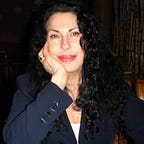WOMEN/SOCIETY/LANGUAGE
Women Of The World Beware Of Being Erased 👩
A campaign is going on to eradicate the word “woman” from public discourse
Advocates of gender theory have contributed to the current confusion about gender and sexuality by undermining one of the most foundational realities of what it means to be human: the fact that we are created male and female.
Today there is a rapidly growing global recognition that gender is no longer simply binary; there are more than just two genders, more than just male and female. Non-binary persons also exist, along with gender-fluid individuals and people who identify as bi-gender or agender.
That’s fine and dandy. But many see it as a campaign to erase references to women, feeling that it has reached new levels of absurdity, replacing the word “woman” with gender-neutral terms, such as “womb-carrier,” “birthing person,” or “uterus-bearer,” to be more inclusive.
This shift originates in the activism of transgender advocates and has been taken up by progressive and mainstream organizations and the health sector. At the same time, there is a growing concern among women — born biologically female — that these language changes are causing the erasure of women.
